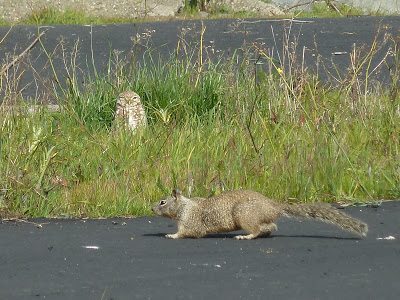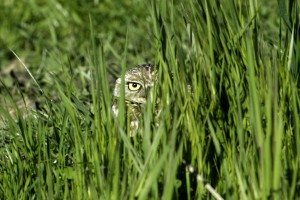GGBA & allies win squirrel reprieve
By April Rose Sommer
Much to the relief of many Golden Gate Bird Alliance members, the Berkeley City Council voted Tuesday night to delay its pilot program to exterminate Cesar Chavez Park California ground squirrels.
The city had generated broad outcry earlier this year when it announced plans to trap and kill park squirrels as a means to address Regional Water Quality Control Board concerns that squirrel burrows could cause toxics underneath the park to leach into the bay.
But on Tuesday, the Council put the extermination plan on hold and directed the City Manager to report back in two months with a plan and a response to the many questions raised by citizens, councilmembers, and environmental and animal rights organizations, including Golden Gate Bird Alliance.
Councilmember Kriss Worthington led the efforts for a reconsideration of the extermination pilot program and Councilmember Linda Maio was careful to stress that the pilot program would not go forward until the council had revisited the issue. Councilmember Maxwell Anderson waxed poetic about how the park used to be filled with raptors, the squirrels’ natural predators, and recommended that there be an effort to draw these birds back to the park, while Councilmember Gordon Wozniak complained that there are too many squirrels.

The squirrel extermination scheme was crafted as a response to concerns by the Regional Water Quality Control Board that squirrel burrows could be allowing toxics to leach into the Bay. Cesar Chavez Park is built on top of a landfill that was covered with layers of fill intended to “cap” the old dump’s solid and toxic waste. Although the bay waters surrounding the park have not tested positive for any leached materials, the Board did direct the City to address the potential risk from squirrel burrows.
The Water Board was careful to distance itself from the City’s extermination plan, though — instead suggesting that enforcement of the no-feeding ordinance may be sufficient to address the large squirrel population. The Board recently issued a FAQ that clearly states “we are not ordering the City to kill the squirrels” and requested that the City supply further data on the burrows and methods of control.
Golden Gate Bird Alliance’s East Bay Conservation Committee researched the issue, submitted a comment letter to the Berkeley City Council, and spoke at Tuesday’s Council meeting . GGBA called for collection of further data, strict enforcement of the city’s existing no-feed ordinance, vegetation modification to create habitat less desirable to squirrels, increased efforts to encourage natural predation, and consideration of squirrel contraceptives as alternatives to trap and kill.

GGBA opposed the extermination plan as part of its commitment to protect California native wildlife. The squirrels form an essential part of the natural environment, serve as an important food source for large raptors and snakes, and create burrows that are essential for Western Burrowing Owls that winter at Cesar Chavez Park.
GGBA has long been a steward of the Cesar Chavez Park’s overwintering Burrowing Owl population, and hopes to work with the City to maintain healthy Burrowing Owl and squirrel colonies while insuring that the Bay is safe from landfill leaching.
I walked the park for many years and never saw a Burrowing Owl until a GGBA owl docent showed me a football-sized, ground-colored lump that transformed into a fierce little owl through the docent’s spotting scope. It is a bird that quickly grabs the heart of even the most casual observer and is one that the City of Berkeley has generally supported as an important natural resource.
The Burrowing Owl has a rare symbiotic relationship with California ground squirrels. The small owls find squirrel burrows to be a perfect fit for their winter homes. In Southern California, the U.S. Fish and Wildlife Service is currently conducting a “squirrel translocation program to create self-sustaining burrowing owl habitat” — in other words, they are importing squirrels to create improved habitat for Burrowing Owls!

If an increase in ground squirrels is supportive of Burrowing Owl populations, a decrease may well have a negative impact on the owls. You can read more about this at the U.S. FWS field notes page, Burrowing Owls and California Ground Squirrels Need Each Other .
Research has also shown that squirrels may also protect Burrowing Owls from predators by sounding the alarm when hawks, snakes, skunks, foxes, or even ravens pose a threat. A San Jose State graduate student studied a Burrowing Owl and ground squirrel colony at Moffett Federal Airfield in Santa Clara County. She found that the squirrels took alarm much more often than the owls, and the owls responded to 65.5% of squirrel alarm calls, while squirrels responded to only 25.8% of owl alarms. She concluded, “This research suggests healthy ground squirrel populations may provide important predator-avoidance services in Burrowing Owl habitat, and that predation should be of greater concern to Burrowing Owl conservation.”
GGBA will continue to follow this issue and will partner with the City wherever possible to find alternatives to trapping and killing ground squirrels. One thing that GGBA, the Water Board, and the City all agree upon is that feeding of squirrels is a major contributor to the Park’s large squirrel population.
If you feed squirrels or other wildlife at the Park or elsewhere, please find another way to interact with animals, such as joining one of our field trips or taking up wildlife photography.
And if you see others feeding wildlife, please do your best to discourage them from doing so – it is illegal and harmful for the animals in more ways than one. While the pilot program is currently on hold, it has not yet been officially canceled. So people who feed the squirrels at Cesar Chavez Park could be bringing a death sentence for the very animals they are trying to help.
——————————
GGBA’ East Bay Conservation Committee will continue to follow the squirrel issue and advocate for a humane, science-based solution that protects both wildlife and water quality. Want to get involved? The committee meets at our office on the second Tuesday of each month. Click here for details.
————————-
April Rose Sommer is an avid outdoorswoman, animal-lover, and conservationist born and raised in the East Bay. She practices environmental law at her firm Sommer Public Interest Law and advocates for birds and habitat protection on the GGBA Conservation Committee. Her birding skills are a work in progress but she enjoys caring for raptors and raising baby songbirds as a volunteer in the Lindsay Museum Wildlife Hospital.
